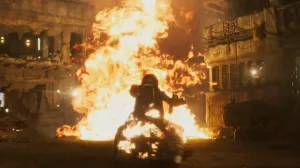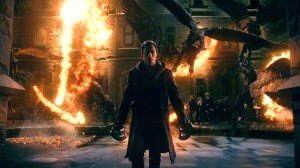In taking a new route to a familiar destination, AMC’s Fear the Walking Dead fulfills its mission statement almost immediately and, in so doing, plants its flag as a companion piece in the truest sense to television’s most successful drama.
Videos by ComicBook.com
The series, set in the world of AMC’s The Walking Dead, will enter the popular consciousness with a lot of baggage when it debuts tonight, but it deftly manages expectations in its initial outing to create an oversized episode of TV that simultaneously sets the stage for its characters and manages expectations for its world.
The conflict viewers will experience is evident from the start: Fans will “know” where the world is going, and many will want it to hurry up and get there. The showrunners obviously understand this, and have built into the pilot just enough familiar ground that fans of The Walking Dead shouldn’t be too upset by the fact that it’s going to take some time to get there.
There aren’t any grand battle scenes, there aren’t a lot of people running around with guns and knives and crossbows. The undead are there, though. Both physically and narratively they have a presence and a part to play. So far, though, it’s more about teasing their eventual role and occasionally fooling the audience into thinking they know what’s next, than about diving headlong into Romero-style mayhem.
But there’s a big reason why now is the time for Fear The Walking Dead, as the core series heads into Alexandria and a seismic status quo shift for the characters and world.

Writers and producers have said since Fear the Walking Dead was first announced that a big part of its function would be to examine the fall of society. In this way, it’s coming along at a perfect time to be a counterpart to The Walking Dead.
In the comics — and, based on interviews, on television as well — the discovery of the Alexandria Safe-Zone led Rick and his group to begin working to re-establish the society they had lost. While for years, things just got darker and darker for our survivors, it’s likely no coincidence that Fear The Walking Dead will now “fill in the blanks” of society’s downfall just as The Walking Dead begins taking rasping, shambling baby steps toward rebuilding a larger world.
It’s a sound creative choice; in The Walking Dead, much of the first season centered on making the audience as uncomfortable and disoriented as Rick. Too many knowing winks and nods would have stripped him of his role as the point-of-view character and ultimately made it more difficult to differentiate the show from other zombie series. With Fear, though, the characters begin the series blissfully unaware of what the audience knows will soon befall them. We meet them in their homes, on their terms. We see them at their best and worst, but it’s all very relatable.
Survival is an abstract concept to the characters in Fear The Walking Dead, not a day-to-day reality. In that way, they’re quite a bit like the survivors at Alexandria when Rick and company showed up last year. Allowing them to talk openly about their problems — Madison’s boss seems to know quite a lot of her personal business, so she’s not playing much close to the vest — endears them to the viewer and as such, disperses the audience’s attention. With Rick, he was a point-of-view character in the pilot because he was the viewer’s eyes and ears. Madison, Travis and their families are not meant to represent the viewer; they’re the viewer’s loved ones.
There’s a subtle storytelling device in the pilot: Nick makes a lot of poor decisions in his life, and Madison and Alicia aren’t sure how to help him. They look on, feeling helpless, while he does stupid, potentially dangerous things. Whether it’s Travis, Madison or Alicia, everyone has a kind of protective, parental feeling toward Nick, even though it’s said more than once that it’s all probably for nothing.
Well…that’s a little bit of how it feels to watch Fear The Walking Dead. You don’t have a point-of-view character. You aren’t Rick Grimes. But you aren’t Madison Clark, either. You’re watching the lives of these people who are well-enough developed that you start to care about them, and you’re watching them make mistakes, and you’re hoping against hope that they won’t end up exactly the way you know they’re all going to end up, sooner or later.









